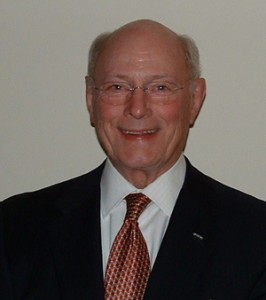Evan Hineman ’56 honored for lifetime excellence in intelligence community
 If anyone knows how quickly America’s security needs can change, it’s Evan Hineman ’56. With over 50 years of intelligence experience, Hineman was honored with the United States Geospatial Intelligence Foundation (USGIF) Lifetime Achievement Award.
If anyone knows how quickly America’s security needs can change, it’s Evan Hineman ’56. With over 50 years of intelligence experience, Hineman was honored with the United States Geospatial Intelligence Foundation (USGIF) Lifetime Achievement Award.
“It is a very humbling experience,” says Hineman, a private consultant who provides intelligence advice to government and private sector organizations. “I was shocked. The evening the award was presented, it was difficult to get some of the words out of my mouth because I was overwhelmed. I got through my acceptance speech and had the opportunity to recognize my wife of 52 years, Barbara. My son also attended the event.”
An ROTC student at Lafayette, Hineman received a commission as second lieutenant and quickly developed an interest in his technical intelligence classes at Aberdeen Proving Grounds. He joined the CIA in 1964, when he led a trajectory analysis division in the Foreign Missile and Space Analysis Center and held the positions of division director of missile and space systems in the Office of Weapons Intelligence, associate deputy director for intelligence, and deputy director for science and technology and director of Program B of the National Reconnaissance Office (NRO).
The political and international landscape has changed dramatically since Hineman began his career. The change in adversaries has made the most impact on U.S. intelligence efforts.
“When I began my career, the Soviet Union and its Warsaw Pact partners had views of ruling the world or at least being the preeminent player,” he explains. “The Soviet Union was building a nuclear arsenal with the intention of holding the U.S. and the free world hostage. The pace of activity was much slower. Today, the adversary in many cases does not fly a national flag or have territory, and the weapons, drugs, hostage-taking, truck bombs, and commercial airliners are available almost instantly. In the case of the Soviet Union, we knew where the enemy was, we knew his intentions, and while it was difficult and expensive, we could watch him. The problem is magnified today when we face the terrorist groups.”
Hineman believes America’s liberty is related directly to the quality of intelligence its leaders receive.
“The national security of the U.S. – and intelligence is a vital player in our national security – is fundamental to our everyday life we enjoy,” he says. “We talk about liberty and freedom, but we do not really think about what those terms mean since we take them for granted. This is a great country and its people deserve the best intelligence that can be provided to the leadership in order to ensure our security.”
A mechanical engineering graduate, Hineman benefited throughout his career from the blending of liberal arts and engineering at Lafayette.
“Having been influenced by liberal arts faculty and students, we were a much more well rounded group of engineers than one would find coming from a strictly engineering school,” he says. “I can remember many times when it was necessary to serve as an ‘interpreter’ between a very talented engineer and a policy maker with a liberal arts background on a technical intelligence problem or conclusion.”
After retiring from the CIA in 1989, Hineman held several high-level positions with various private intelligence corporations. He is the recipient of the CIA’s distinguished intelligence medal, the NRO’s distinguished service medal, and two national intelligence distinguished service medals. He encourages students to contact him with questions or advice about the intelligence field.
 If anyone knows how quickly America’s security needs can change, it’s Evan Hineman ’56. With over 50 years of intelligence experience, Hineman was honored with the United States Geospatial Intelligence Foundation (USGIF) Lifetime Achievement Award.
If anyone knows how quickly America’s security needs can change, it’s Evan Hineman ’56. With over 50 years of intelligence experience, Hineman was honored with the United States Geospatial Intelligence Foundation (USGIF) Lifetime Achievement Award.